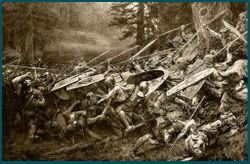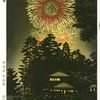Rómaveldi
31.1.2014 | 05:56
Edward Gibbon skrifađi hiđ frćga sagnfrćđirit The History of the Decline and Fall of the Roman Empire (1776-89). Í ţeirri bók kemst hann oft skemmtilega ađ orđi. Hann segir međal annars:
The northern countries of Europe scarcely deserved the expense and labour of conquest. The forests and morasses of Germany were filled with a hardy race of barbarians, who despised life when it was separated from freedom: and though on the first attack they seemed to yield to the weight of Roman power, they soon, by a signal act of despair, regained their independence and reminded Augustus of the vicissitude of fortune.
Um Skotland hefur Gibbon ţetta ađ segja:
The masters of the fairest and most wealthy climes of the globe turned with contempt from gloomy hills assailed by the winter tempest, from lakes concealed in a blue mist, and from cold and lonely heaths over which the deer of the forest were chased by a troop of naked barbarians.
Gibbon var Englendingur.
Ađ lokum er hér lýsing á Róm og ţeim trúarbrögđum sem ţar tíđkuđust. Segja má ađ ţetta sé dćmi um forna fjölmenningu:
The policy of the emperors and the senate, as far as it concerned religion, was happily seconded by the reflections of the enlightened, and by the habits of the superstitious, part of their subjects. The various modes of worship which prevailed in the Roman world were all considered by the people as equally true, by the philosopher as equally false, and by the magistrate as equally useful. And thus toleration produced not only mutual indulgence but even religious concord.
Svo mörg voru ţau orđ.







Athugasemdir
Aldrei hef ég lesiđ ţessa frćgu bók.
Gott hjá ţér ađ tína hér til ýmsar tilvitnanir í ţetta verk og vonandi fleiri.
Jón Valur Jensson, 1.2.2014 kl. 02:44
Takk, Jón Valur. Gibbon er fantagóđur penni. Sýn hans á söguna og mannlegt eđli er fremur dökk en heillandi. Ţessi skilgreining er frćg: „History is indeed little more than the register of the crimes, follies and misfortunes of mankind".
Wilhelm Emilsson, 1.2.2014 kl. 04:50
Já, góđur!
En reyndar er nú margt gott líka í sögunni, jafnvel okkar!
Jón Valur Jensson, 1.2.2014 kl. 23:14
Já, ţađ er margt gott í sögunnu, sem betur fer, eins og dćmiđ sem nefnir.
Gibbon skrifađi ţetta líka áđur en frjálslynd lýđrćđisríki, međ öllum ţeim réttindum og skildum sem ţeim fylgja, komu til sögunnar. Ef hann hefđi haft tćkifćri til ađ sjá ţá ţróun vćri dómur hans ef til vill mildari. En mađur veit aldrei. Kannski hefđi hann sagt: „Ţađ var allt í steik ţegar ég var og hét. Og ţađ er allt í steik núna. Ţađ er alltaf allt í steik á ţessum hnetti!"
Sumir eru aldrei ánćgđir.
Wilhelm Emilsson, 2.2.2014 kl. 21:23
Bćta viđ athugasemd [Innskráning]
Ekki er lengur hćgt ađ skrifa athugasemdir viđ fćrsluna, ţar sem tímamörk á athugasemdir eru liđin.